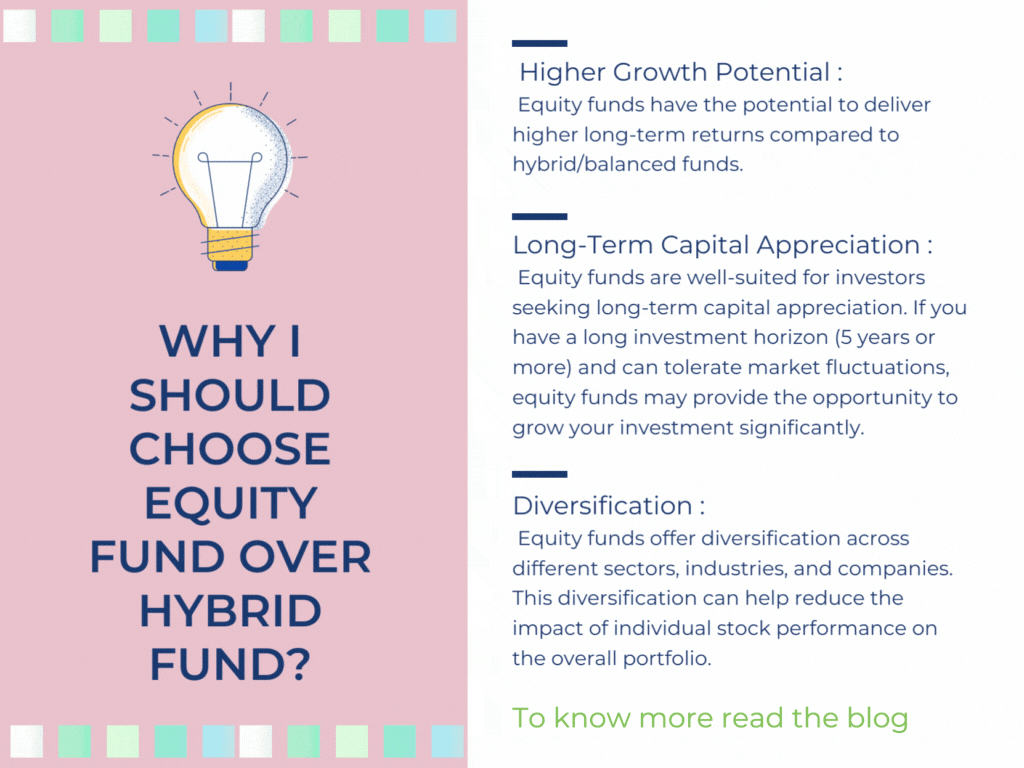Why I should choose Equity fund over Hybrid/Balanced fund?
Choosing an equity fund over a hybrid/balanced fund depends on your investment goals, risk tolerance, and desired asset allocation. Here are some reasons why you might consider investing in an equity fund:
Higher Growth Potential: Equity funds have the potential to deliver higher long-term returns compared to hybrid/balanced funds. Since equity funds primarily invest in stocks, they offer the opportunity to participate in the growth and profits of companies. Over the long term, equities have historically outperformed other asset classes, albeit with higher volatility.
Long-Term Capital Appreciation: Equity funds are well-suited for investors seeking long-term capital appreciation. If you have a long investment horizon (5 years or more) and can tolerate market fluctuations, equity funds may provide the opportunity to grow your investment significantly.
Customizable Asset Allocation: By investing in equity funds, you have the flexibility to allocate your portfolio according to your risk appetite and investment goals. You can choose the percentage of equity exposure based on your preferences and adjust it over time. This customization allows you to fine-tune your portfolio to align with your specific needs.
Diversification: Equity funds offer diversification across different sectors, industries, and companies. This diversification can help reduce the impact of individual stock performance on the overall portfolio. By investing in equity funds, you gain exposure to a wide range of stocks, which can potentially improve the risk-reward profile of your investments.
Inflation Protection: Equity investments have the potential to outpace inflation over time. As companies increase their earnings and stock prices rise, equity investments can help preserve and increase purchasing power. This makes equity funds suitable for investors looking for a hedge against inflation.
However, it's important to consider the following points when comparing equity funds to hybrid/balanced funds:
Volatility and Risk: Equity funds are generally more volatile and carry higher market risk compared to hybrid/balanced funds. The stock market can experience significant fluctuations, and equity funds can be subject to short-term volatility. If you have a lower risk tolerance or a shorter investment horizon, hybrid/balanced funds may provide a more stable investment option.
Income Generation: Hybrid/balanced funds typically have an allocation to fixed-income securities, such as bonds or debt instruments. These fixed-income holdings generate regular income, making hybrid/balanced funds suitable for investors seeking both income generation and capital appreciation. If you prioritize regular income along with potential growth, a hybrid/balanced fund might be more suitable for your investment needs.
Risk Mitigation: Hybrid/balanced funds aim to provide a balance between growth and stability by combining both equity and fixed-income investments. This allocation strategy helps mitigate the potential downside risk associated with pure equity funds. If you prefer a more balanced approach to investing and want to reduce the impact of market volatility, a hybrid/balanced fund may be a better fit.
Simplified Portfolio Management: By investing in a hybrid/balanced fund, you delegate the task of asset allocation and rebalancing to the fund manager. This can be beneficial if you prefer a more hands-off approach to managing your investments. Hybrid/balanced funds provide a diversified portfolio within a single investment vehicle, simplifying the management process.
Lower Volatility: Hybrid/balanced funds tend to have lower volatility compared to equity funds. The inclusion of fixed-income securities can help stabilize returns and reduce the impact of market swings. If you have a lower risk tolerance or seek more stable investment performance, a hybrid/balanced fund might be more suitable for you.
Ultimately, the decision between equity funds and hybrid/balanced funds should be based on your individual financial goals, risk tolerance, and investment preferences. It can be beneficial to diversify your portfolio across different asset classes to achieve a balance between growth potential and stability. Consulting with a financial advisor can provide personalized guidance based on your specific needs and circumstances.


